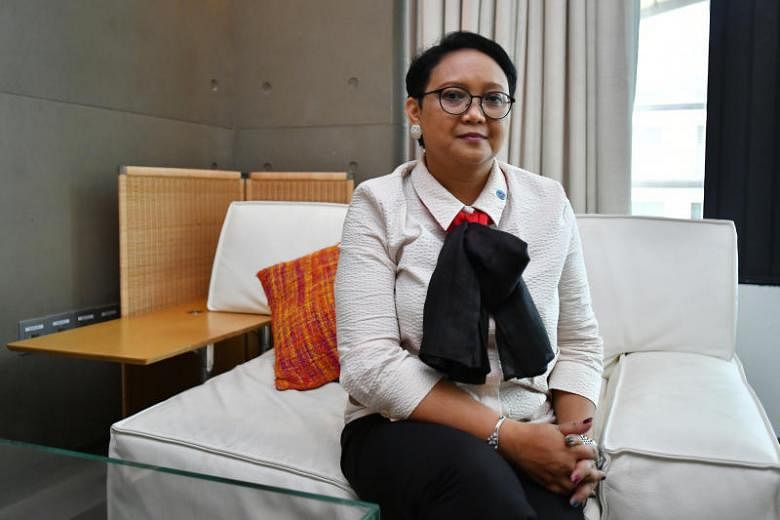JAKARTA - Indonesia wants to work with other Asean countries to strengthen the regional architecture through Indo-Pacific cooperation, Foreign Minister Retno Marsudi said in her annual speech on Wednesday (Jan 9).
The world's largest archipelagic nation aims to focus on maintaining stability, security and welfare in regions surrounding the Pacific Ocean and the Indian Ocean, which it considers a "single geo-strategic theatre".
"We must all ensure that the Indian and Pacific Oceans do not become a site of battle for natural resources, regional conflicts and maritime supremacy," Ms Retno said at the event attended by foreign ambassadors and diplomats.
The United States, Japan, Australia and India have advocated the concept of a "Free and Open Indo-Pacific" to augment strategic cooperation among like-minded maritime powers. It involves countries situated within the world's major oceans.
However, there have been different interpretations of the concept. The US, for instance, envisions wider cooperation with Japan, Australia and India as a way to contain China, which has been trying to exert greater power over South-east Asean countries through its multitrillion-dollar Belt and Road Initiative.
Indonesian President Joko Widodo first introduced the country's vision of the concept during the East Asia Summit last November in Singapore. It is based on the key principles of openness, inclusivity, cooperation, dialogue, respect for international law and Asean centrality.
Asean so far has yet to unite in one voice on the issue and may deliberate it in the upcoming foreign ministers' retreat next week in Chiang Mai, Thailand.
Dr Beginda Pakpahan, a political and economic analyst on global affairs at University of Indonesia, said Indonesia must exercise its free and active approach at the centre of major powers and cooperation.
Along with its Asean neighbours, Indonesia must take an independent stance in the creation of regional governance based on the Indo-Pacific concept, he added.
"The goal is to make Asean an axis of symmetrical interests between itself and its external partners. It can offer peace, regional stability and economic prosperity for countries located between the two oceans," Dr Beginda told The Straits Times.
"By existing means, such as East Asia Summit and Asean regional forums, Indonesia and other Asean countries must position itself in the driver's seat in the Indo-Pacific framework," he added.
Ms Retno, who is Indonesia's first female foreign minister, also said Asean must be proactive in responding to developments in the region and become the driver of change.
Underlining the importance of stability and security in the South China Sea, she said Indonesia will make sure that the Declaration on the Conduct of Parties, which Asean and China settled late last year, can be fully implemented, and an agreement on the Code of Conduct will be completed within the next three years as expected.
Indonesia also plans to introduce several initiatives to expand regional partnerships, including the Indonesia-South Pacific Forum and Indo-Pacific Maritime Dialogue.
In addition, it will exercise its rights as a member of the United Nations Security Council this year till next year.
It will focus on peace keeping, fight against terrorism, and support of Palestine, among other issues, said Ms Retno.
On the Palestine issue, the Foreign Minister expressed Indonesia's concern over a change of position by a few countries that has resulted in the violation of the UN resolution, which should serve as the basis of the settlement in the Israel-Palestine conflict.
"Indonesia will continue to be in the front line in helping the struggle of Palestinian people," she said.
Indonesia, the world's biggest Muslim-majority country, supports a two-state solution to the conflict.
The Indonesian Ulema Council will set up a hospital in Hebron, an ancient Palestinian city situated about 30km from Jerusalem, which has been at the centre of conflict between Palestinians and Jewish settlers.


